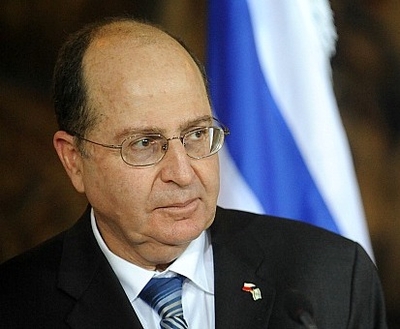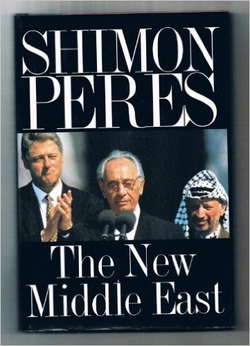Foreign Affairs magazine has published a major statement from Israel's former minister of defense Moshe Ya'alon, a likely future candidate for prime minister, on his view how to end the Israeli-Palestinian conflict, titled "How to Build Middle East Peace: Why Bottom-Up Is Better Than Top-Down" (Jan.-Feb. 2017).
 Moshe Ya'alon (b. 1950). |
Ya'alon offers an impressive analysis of why decades of diplomacy failed and its enduring stagnation. His "bottom-up" solution contains four elements, three of which are somewhat antique bromides and one of which is an exciting, untried idea – the three-way option that I will dwell on below.
Stripped to its essentials, Ya'alon's article calls for (bolding is mine):
- "the promotion of Palestinian economic growth and infrastructure development"
- "improve Palestinian governance, anticorruption efforts, and institution building in general"
- "Israeli-Palestinian security cooperation"
- "a regional initiative that would bring in Arab states interested in helping to manage and eventually solve the Israeli-Palestinian conflict - whether or not those states have formal relations with Israel"
The first three have been tried repeatedly through the decades and failed to bring resolution closer:
Shimon Peres in 1993 published The New Middle East, his lovely vision of a prosperous Palestinian population that's a good neighbor for Israel. Trouble is, both then and now his hopes have been shattered by Palestinian rejectionism, incitement, and death cultism. Surely, no one still seriously believes in 2017 that enrichment will moderate Palestinians.
Shimon Peres' New Middle East did not quite pan out.
- George W. Bush focused on improved governance in 2002 but fifteen years later things are more wretched than ever, what with anarchy, corruption, and violent feuding. Worse, the historical record strongly suggests that good governance would just lead to a more efficient Palestinian machine for attacking Israel.
- Security cooperation is an area – virtually the only one – where Israel and the Palestinian Authority work together: basically, the Israel Defense Forces protect the PA and the PA helps the IDF stave off attacks. However mutually useful, this collaboration has shown zero potential to expand to resolve their larger conflict.
In contrast, the fourth proposal, bringing in the Arab states, is an important initiative that has yet seriously to be attempted; here, Ya'alon's plan holds out real hope.
That's because a remarkable symmetry exists between what Palestinians want from Israel and what Israel wants from the Arab states plus Turkey and Iran, namely recognition and legitimacy. Noting this parallel, I proposed in the Wall Street Journal in 1990 that both aspirations be addressed in tandem, linking "concessions to Israel by the Arab states with Israeli concessions to the Palestinians." Everyone thereby gains: "The Arab states achieve what they say is their main goal, justice for the Palestinians. Israel gets peace. Palestinians have their state."
For example, if the Saudis end their economic boycott of Israel, Israelis increase Palestinian access to international markets. If the Egyptians warm up relations, Palestinians have more access to the Israeli labor market. When the major Arab states sign peace treaties with the Jewish state of Israel, the Palestinians get their state.
The Obama administration made a short but intense feint in this direction in 2009 but the Saudis turned it down and it sputtered to a close. Egypt's President Sisi raised the idea again in 2016, again without consequence. In short, the three-way option between the Arab states, Israel, and the Palestinians has not yet been pursued in a serious or sustained way.
 Even bowing to Saudi King Abdullah did not get Obama cooperation on Israel. |
With Sisi and Ya'alon now on record favoring the three-way option, and with Arab states shaken awake by the Obama administration's bizarre cooperation with Tehran, Middle Eastern leaders may be willing to work with the Jewish state in ways they were not ready for in 1990 or 2009. It's certainly worth a try by the incoming Trump administration.
Progress in Arab-Israeli diplomacy will not come from retreading the defunct ideas of Peres or GWB; nor can security cooperation possibly lead to political breakthroughs. My first preference remains U.S. support for an Israeli victory; but if that is too much for now, then involving the Arab states at least offers a way out of the stale, isolated, and even counterproductive sequence of Israeli-Palestinian negotiations.
Mr. Pipes (DanielPipes.org, @DanielPipes) is president of the Middle East Forum. © 2017 by Daniel Pipes. All rights reserved.
Jan. 25, 2017 addenda: (1) This article builds on an idea I first published in 1990 as "Don't Despair - Middle East Peace Is Still Possible."
(2) Adam Garfinkle of the American Interest magazine proposed the three-way option in a 2016 interview with Ya'alon, who provided information in his response that he did not include in his Foreign Affairs article. Garfinkle suggested:
The way Palestinian politics is constituted now, movement toward a more conciliatory perspective is possible but might take a century, or more. One way to speed up the process might be to pragmatically cocoon Palestinian nationalism in a broader Arab fabric. In other words, if the relevant Arab states who have compatible interests with Israel on a range of issues ... essentially deliver the Palestinians to a deal and vouch for them, we might actually get somewhere.
At the same time, if the Palestinians are cocooned within the Arab League, Israel can be symbolically cocooned within NATO or the OECD or some Western grouping. So the line would be, in essence, "The Israeli government and the Palestinian Authority will sign this piece of paper, but we neighbors will hold the deed and guarantee its fair implementation." That would hard to do and it would not solve everything, but might make it easier to gain institutional traction leading to a better situation.
To which Ya'alon replied: "That's what we tried to do during the past seven years. Alas, so far our Arab neighbors are not willing to invest themselves that way on behalf of the Palestinians."
Comment: Strong American support is needed.
Feb. 19, 2017 update: Ha'aretz has broken the story of a meeting called by Secretary of State John Kerry with the leaders of Egypt, Israel, and Jordan in Aqaba on Feb. 21, 2016. Saudis and Palestinians were consulted. The idea was the three-way. The Associated Press explains:
According to two former Obama administration officials, Kerry proposed regional recognition of Israel as a Jewish state - a key Netanyahu demand - alongside a renewal of peace talks with the Palestinians with the support of the Arab countries. ...
Kerry tried to sweeten the 15-year-old "Arab Peace Initiative," a Saudi-led plan that offered Israel peace with dozens of Arab and Muslim nations in return for a pullout from territories captured in the 1967 Mideast war to make way for an independent Palestine.
Among the proposed changes were Arab recognition of Israel as the Jewish state, recognition of Jerusalem as a shared capital for Israelis and Palestinians, and softened language on the "right of return" of Palestinian refugees to lost properties in what is now Israel, the former official said.
As for reactions:
the Egyptian and Jordanian leaders reacted positively to the proposal, while Netanyahu refused to commit to anything beyond meetings with the Palestinian President Mahmoud Abbas. ... the Arab partners also showed varying degrees of enthusiasm, with the Palestinians most concerned about concessions forced on them.
May 15, 2017 update: "Arab Gulf states have offered to take concrete steps to establish better relations with Israel if Prime Minister Benjamin Netanyahu will make a significant overture aimed at restarting the Middle East peace process" reports the Wall Street Journal. More specifically: the Gulf states would lift some trade restrictions, open direct telecommunications links, and permit use of their airspace if Jewish residences are curtailed on the West Bank and the restrictions on Gaza are eased. They might also issue visas to sports teams and trade delegations and open their countries to Israeli trade and investment.
May 25, 2017 update: Donald Trump is reportedly considering an approach to the Arab-Israeli conflict along these lines. From Israel Hayom:
U.S. President Donald Trump will launch an unconventional peace plan that is based on the 2002 Arab Peace Initiative, focusing on upgrading Israel's relations with Arabs states rather than on reaching an agreement between Israel and the Palestinians, a senior Palestinian Authority official told Israel Hayom. The official said Trump conveyed this intent to PA President Mahmoud Abbas when the two met in Bethlehem on Tuesday. ...
According to the Palestinian official, Trump told Abbas that this new effort should not be interpreted as a disavowal of the two-state solution, but only that the president wanted to think outside the box and explore other options. As such, the president reportedly said that if progress would be made in advancing the Arab Peace Initiative, he would try to strike an interim peace deal that would focus on the various paths toward a final status agreement culminating with the creation of an independent Palestinian state and a joint Israeli-Palestinian statement declaring an end to the conflict.
The president also reportedly said that the first phase of the plan would include some form of normalization between moderate Sunni-Arab states and Israel. Later on, depending on how much progress is made, the U.S. would try to launch direct negotiations between the Israelis and the Palestinians with a set timetable aimed at finding a compromise on core issues such as borders, the status of Jerusalem, the fate of Judea and Samaria communities outside the major settlement blocs, and the right of return of Palestinian refugees. This marks a shift in the usual prescription for peace, since Arab leaders have repeatedly said that normalization of relations must come only after core issues are resolved and a Palestinian state is established with Jerusalem as its capital.
The Palestinian official said that Trump made it clear to Abbas that he would like to see Saudi Arabia and other Arab states—presumably in the Persian Gulf—begin normalizing ties before the Israelis and Palestinians reach a deal. Trump also reportedly said that Saudi Arabia, Jordan, Egypt and various nations in the gulf were ready to accept this template in principle. According to the Palestinian official, the normalization of ties will be largely symbolic. Namely, Saudi Arabia and other Arab and Muslim states will recognize the State of Israel and its right to exist but they would not sign peace treaties or open embassies in Israel.
"The Arab Peace Initiative has stalled because the talks [between Israel and Palestinians] have repeatedly unraveled for various reasons," the Palestinian official said. "Trump wants to promote a different approach because all previous attempts to move forward in the peace process failed.
"The president stressed that Saudi Arabia and other states are willing to give this new approach a chance and that upending conventional wisdom—namely, having normalization with Arab states precede Israeli-Palestinian peace talks—could usher in a new peace process that would have a set timetable, culminating with the creation of a Palestinian state that would recognize Israel, as well as a joint statement declaring an end to the conflict and the settlement of all claims."
Aug. 13, 2020 update: The joint statement issued by the United Arab Emirates and Israel incorporates precisely the exchange I proposed above: the UAE agrees to normalize relations in return for an Israeli concession vis-à-vis the Palestinians, i.e., not annexing any part of the West Bank.
